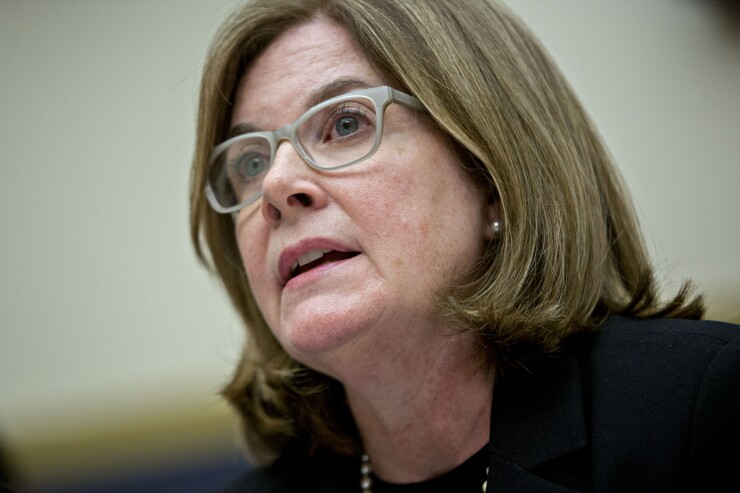A Federal Reserve official helping lead the central bank's faster payments initiative is rejecting criticism of the Fed's potential development of a real-time payments system.
Esther George, president of the Federal Reserve Bank of Kansas City, defended the Fed system's record as a provider of payment services in an interview with American Banker, saying the central bank's participation in the market has benefited the public.
The Fed's role has come under the microscope with indications the central bank may develop its own real-time payments solution rather than just encourage market innovation. Critics say the Fed should step aside to let the private sector lead the way, with some even questioning the record of the Fed's existing automated clearinghouse service.

George, who chairs the Federal Reserve’s Financial Services Policy Committee and served as executive sponsor of the Fed’s payments improvement project, explicitly
“To the argument about the Fed somehow hampering the effectiveness of that payment system, I think it's not well-founded,” George said.
As the Federal Reserve Board nears the completion of
“On the whole, consumers pay less today by virtue of the competition that comes from having the Fed as a provider in [ACH]," she said, adding, "The evidence ... would tell a different story" than some of the criticism.
"That's why, even as we look at the potential for a role in real-time payments, we have to reassess — again in today's environment — will that be appropriate going forward or is this something the private sector can adequately handle?” George said.
In an
"A number of competitors have raised issues with Fed pricing practices in the operation of its payments systems, which they feel involve unfair bundling or other anticompetitive practices," wrote Verret, an associate professor at George Mason University Antonin Scalia Law School. "The fact that the Federal Reserve is not subject to federal antitrust law, while competitor payments systems are, further suggests the central bank should get out of the payments system business."
That echoed the sentiment raised by James Aramanda, president and chief executive of The Clearing House, who argued in an earlier BankThink article that the idea of a Fed-run real-time payments system is "misdirected."
"It is wrong that a public-sector payments system is needed as an alternative to the RTP system to create competition," he said.
Several industry groups have called on the Fed not to establish its own faster payments system, while
Federal Reserve Vice Chairman for Supervision Randal Quarles said during a House Financial Services Committee hearing last month that "no decision has been made" by the Fed board on how to proceed with faster payments. He said the board doesn't "have a concrete timeline" but the the matter is "under active consideration."
George said that the Fed is considering the extent to which the Fed’s experience in the ACH marketplace would apply to a faster payments format, but suggested that there is reason to think that it would.
“When you think about the functionality of real-time payments — the ability to take money out of your account immediately, send it to someone with finality — is really just taking that check, I think, a step further and digitizing it,” George said.
“But we are bound by our public role and the criteria we have to say, ‘How has the landscape changed?” George continued. “So we reassess at each time. Even though this may look like just a more modern version of the paper check, the truth is we have to look at the landscape and say, ‘Would we be able to recover our cost, as we are required by law? Can we demonstrate that our role would benefit the public broadly?’ And that of course is the work that's been underway.”
George noted that since the faster payments task force submitted its report for public comment late last year and those comments have been received, the Fed has concluded the fact-finding portion of its decision-making process. Any ultimate decision will be made by the Federal Reserve Board in Washington, she noted, and there is no way to know how long it will take for the board to reach a conclusion.
“This is a decision that will be made by the Board of Governors in Washington and I have not seen a date for which they will make that decision,” George said. “I will tell you, though, in my role around this effort and working with them, the analysis has been largely completed, and I think now the board is really just looking at all the factors there. So we're anxious to have their decision.
“I think, when you think about the marketplace and entities in the market that are waiting to hear an answer back to the question that was posed to the Fed, I think all of us understand the importance of doing this in a timely fashion,” George said.





